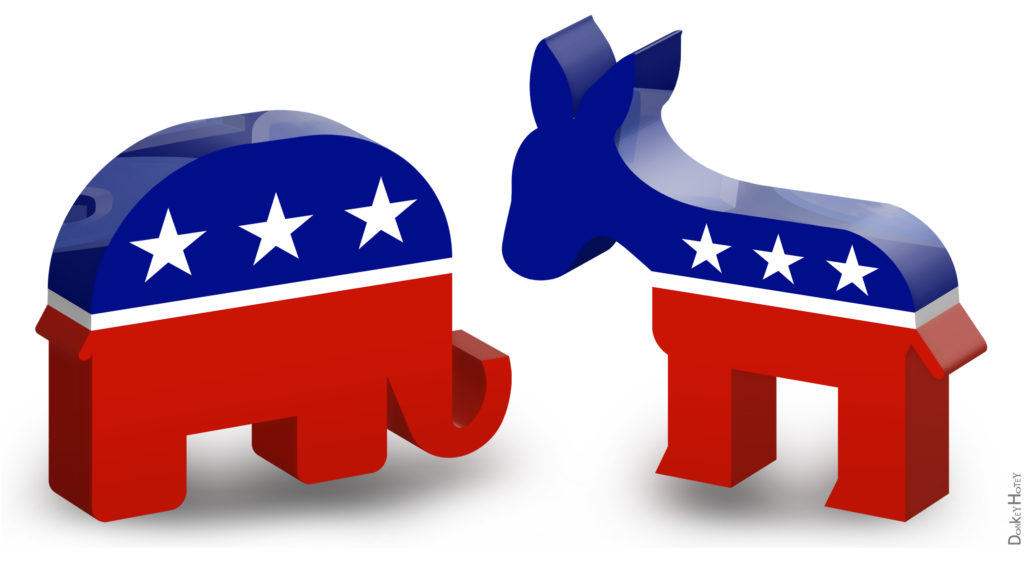Democrats will likely find themselves riding a blue wave to victory come November. According to survey data released by the Harvard Public Opinion Project on Monday, young Americans (ages 18-29) are becoming disenchanted by President Trump and the Republican-led Congress, and favorable of Democratic leadership in 2018.
The HPOP report states that over 80 percent of young Americans who are likely to vote in the 2018 midterms disapprove of the Republicans in Congress, and 76 percent of those likely to vote disapprove of Donald Trump as president. Seventy percent of likely voters said they preferred Democratic control over Republican control in Congress following the 2018 midterms.
Whether or not Democrats will be able to capitalize on young voters’ disapproval of Republicans remains unclear. In April 2014, HPOP reported that young Americans trusted the Republican-led Congress “to do the right thing” only 14 percent of the time. But in the 2014 midterms, the Center for Information and Research on Civic Learning and Engagement reported that 58 percent of all young registered voters failed to vote, leaving up to 12.4 million ballots blank. Ultimately, Republicans widened their majority to its strongest point in nearly a century.
While Democrats have rejoiced in their special election victories in previously Trump-led districts, extrapolating beyond these instances comes with many statistical dangers. Special elections are more likely than general elections to be swung by the quality of each candidate rather than national trends.
However, the HPOP survey suggests that this energy will translate into votes for Democrats during the midterm elections. Of the participants who self-reported as “likely voters,” 55 percent identified themselves as Democrats, while only 21 percent identified as Republicans. Roughly 53 percent of respondents said they will “definitely” or “probably” vote in the 2018 midterms.
In the past, complicated voter registration processes have prevented young voters from mobilizing. In 2014, young voters attempting to register were likely hampered by restrictive voter laws that complicated the registration process.
But according to HPOP, 73 percent of young Americans said that they are registered to vote, with 96 percent of likely voters indicating that they are already registered. A higher turnout among young Americans would mirror young voters’ heightened participation in the 2006 midterms, which also came under a Republican Congress and president. Increased turnout could also mark increased awareness of voter suppression laws, the progress of automatic and online voter registration laws in states like California, Illinois, and Oregon.
If Republicans hope to counter-mobilize this Democratic wave via social media, young voters’ lack of trust in sites like Facebook and Twitter may confound their efforts. While targeted Facebook ads played a key role in the 2016 election, according to HPOP, 23 percent of young Americans currently never trust Facebook “to do the right thing,” and 48 percent only trust Facebook “some of the time.” Twitter’s level of trust among participants mirrored that of Facebook.
While there’s little indication that this distrust will stop young Americans from using these social media sites, it does signal heightened caution about what information they’re sharing, and thus what information political advertisers and campaigns can access.
In addition, Americans are also diversifying the social media platforms they get news from, possibly making it challenging for advertisers to pin down voters’ motivations. An August 2017 study conducted by Pew Research Center noted that 26 percent of Americans now receive news from two or more social media sites, up from 18 percent in 2016. The percentage of “news-users” on Youtube and Snapchat has grown by more than 10 percent for each platform since 2016. If Republicans seek to counteract Democrats’ momentum in the fall, they will have to break through an increasingly cautious demographic that operates in a less concentrated manner on social media.
While young Americans’ current distrust of Republicans and Facebook won’t tell all about the 2018 midterms, it does signal an uphill climb for the GOP in the coming months. If Democrats maintain the momentum from their latest special election victories, Republicans will likely find themselves in the Congressional minority next January.
Image Credit: Flickr/DonkeyHotey
